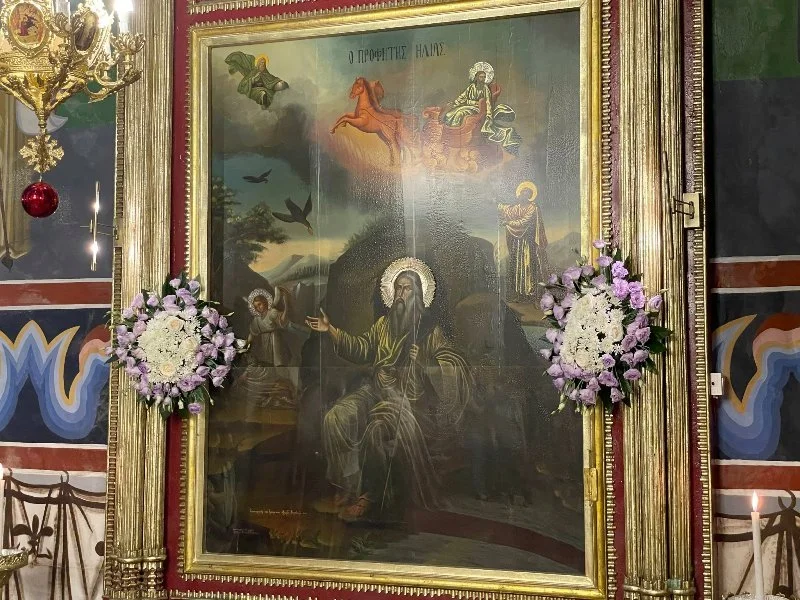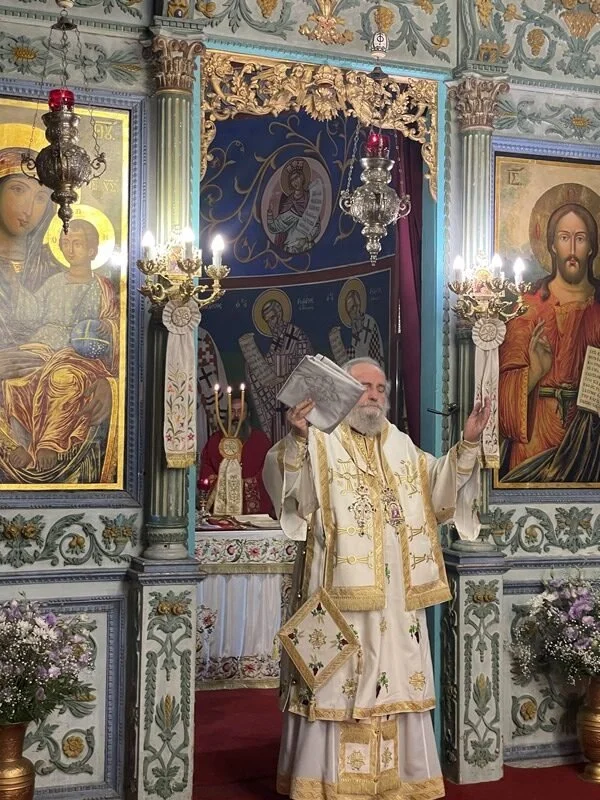The Feast of Prophet Elias at the Greek Orthodox Patriarchate of Jerusalem
On Tuesday, 20 July/ 2 August 2022, the Greek Orthodox Patriarchate of Jerusalem celebrated the feast of the Prophet Elias from Thesbis.
On this feast, which has its origin in the Old Testament, in the books of Kings and in the New Testament, in the Gospels and in Saint James’ letter, Prophet Elias is commemorated as the incarnate angel, the prophets’ summit, the second forerunner of the coming of Christ, the one who casts out sickness and cleanses lepers, who sent down fire from heaven through his prayer and slaughtered the priests of Baal in the altar of Mount Carmel, the one who did not see death but was ascended into the heavens on a fiery chariot and threw down his mantle upon his disciple Elisaios, who walked on it and crossed the river Jordan.
In prophet Elias’ honour, at his Holy Monastery, which is located between Jerusalem and Bethlehem, Great Vespers was held on Monday afternoon, and the Divine Liturgy was celebrated on Tuesday morning. The Services were officiated by His Eminence Metropolitan Isychios of Kapitolias, with the co-celebration of their Eminences the Archbishops, Theodosios of Sebasteia and Aristovoulos of Madaba, Archimandrite Meletios, Priests Farah and Khader from Saint James Cathedral, Priests from Jerusalem, Bethlehem, Beit Jala and Beit Sahour. The chanting was delivered by Saint James Cathedral Byzantine Choir, and the services were attended by faithful from the aforementioned towns and the representative of the Greek Consulate, Mrs Christina Zaharioudaki.
Before the Holy Communion, the officiating High Priest read the sermon of His Beatitude Patriarch Theophilos III, Greek Orthodox Patriarch of Jerusalem, as per below:
“We know thee to be a vessel containing the Divine Spirit, and an Angel upon the earth, breathing the fire of divine zeal, turning away impiety and reproving kings, anointing Prophets, and cutting down with the sword the priests of shame, O Elias, for this cause, we cry to thee: Deliver us from future shame” (Matins, Second Canon, Ode eight, Troparion 1), the hymnographer of the Church proclaims.
Beloved Brethren in Christ,
Noble Christians and pilgrims
The festive commemoration of the fiery ascend into the heavens of the Holy Glorious Prophet Elias the Thesbite, has gathered us all in this Holy Church to glorify Christ in Eucharist, Who has glorified him.
The Prophet Elias is distinguished for his excessive divine, and conscious zeal as his hymnographer says: “Elias the zealot, the lord over the passions…For in his achievements he proved to be an Angel in the body and an incorporeal man” (Entreaty, Troparion 1).
The multiple achievements of the prophetic mission of Elias the Thesbite made him “a man of God”, according to the testimony of the widow from Sarepta of Sidon: “And the woman said to Elijah, Now by this I know that thou art a man of God, and that the word of the Lord in thy mouth is truth” (3 Kings 17:24). This is also confirmed by Saint Luke the Evangelist when he speaks about Saint John the Baptist: “And he shall go before him in the spirit and power of Elias, to turn the hearts of the fathers to the children, and the disobedient to the wisdom of the just; to make ready a people prepared for the Lord” (Luke 1:17).
Interpreting this verse, Zigavinos says: “[the Bible] calls ‘spirit’ the spiritual gift, and power the energy. And he says that both the gift and power he received from Elias”. And Origen notes, “For he does not say ‘by the soul of Elias’; for it was not a reincarnation. But by the spirit and the power of Elias. For there was spirit and power in Elias, which was the spiritual gift, like in each of the Prophets. And the spirit that was in Elias was given to John….and the spirit…that was given to the Prophets he calls a gift”.
The Holy Apostle James, the Brother of God, refers to the Prophet Elias in his letter as an example of the power of prayer: “The effectual fervent prayer of a righteous man availeth much. Elias was a man subject to like passions as we are, and he prayed earnestly that it might not rain: and it rained not on the earth by the space of three years and six months” (James 5:16,17).
The Synaxarist of the Prophet says, “Elias’ zeal for the glory of God is compared to the fire, and his speech is compared to the teaching and examination just like a burning candle; for this reason, he was called a “zealot”. Moved by his Godly zeal, Elias strictly controlled the irreverence, namely the idolatry and the illegal actions of the archons of his era.
It is noteworthy that the righteous Elias sent down fire from heaven on Mount Carmel, which burnt down his sacrifice in front of all the people, for the knowledge of the truth as the Holy Scriptures testify: “And it came to pass at the time of the offering of the evening sacrifice, that Elijah the prophet came near, and said, … Hear me, O Lord, hear me, that these people may know that thou art the Lord God, and that thou hast turned their heart back again. Then the fire of the Lord fell and consumed the burnt sacrifice, the wood, the stones, and the dust and licked up the water in the trench. And when all the people saw it, they fell on their faces: and they said, The Lord, he is the God; the Lord, he is the God” (3 Kings 18:36-39).
Moreover, Prophet Elias separated the route of the river Jordan and crossed it along with his disciple Elisaios as if on dry land, and while he was talking to his disciple, he was suddenly taken up in the heavens by a fiery chariot and was ascended to place where only God knows; “And it came to pass, as they still went on, and talked, that, behold, there appeared a chariot of fire, and horses of fire, and parted them both asunder; and Elijah went up by a whirlwind into heaven” (4 Kings 2:11-12).
And this is because, as Saint John, the Evangelist says, “no man hath ascended up to heaven, but he that came down from heaven, even the Son of man which is in heaven” (John 3:13).
Prophet Elias, my dear brethren, has a special place among the prophets and the righteous of the Law of Moses in the Old Testament. It was rightly said that he resembles the great personalities of Moses and the Forerunner and is considered a type of Christ. Elias appears next to Moses at the Transfiguration of our Lord Jesus Christ on Mount Tabor. Elias and Saint John the Baptist are recognised as fervent and strict preachers of repentance…
This news was originally published on the Greek Orthodox Patriarchate of Jerusalem official website. Please click here to read the full text.
















